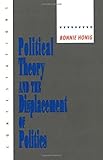http://d.hatena.ne.jp/sumita-m/20070828/1188277338に関連して。
Political Theory and the Displacement of Politicsの中のジョン・ロールズを批判する章で、Bonnie Honigはニーチェの『道徳の系譜』を引いている(p.137)。そこで、ニーチェは「強いが故に処罰する必要のない社会」を論じている。ニーチェ曰く*1、
これについて、Honigは「ニーチェの想像する社会が処罰なしでやってゆくのはその法が「正しい(right)」からでも、その市民がますます従順になるからでもなく、その社会が慈悲(mercy)、「法を超えた」一種の雅量(magnanimity)でもって、正義(justice)(right[正しさ=法=権利]の強要)を克服するからである」という。さらに、このニーチェの想像の意義について以下のように述べる;
A society might attain such a consciousness of power that it could allow itself the noblest luxury possible to it—letting those who harm it go unpunished. “What are my parasites to me?” it might say. “May they live and prosper: I am strong enough for that!”
The scenario is not merely naïve. That it initially strikes the reader that way is one of the most telling points of the reflection. The image of a society so powerful that it does not need to punish is meant not to make us yearn unrealistically for the realization of the ideal, but to invite us to reflect critically on why and how societies punish, to think about punishment (its gravity, its sites, and its frequency) as a measure of societal need rather than individual deviance, as a signal of social weakness rather than administrative resolve.

Political Theory and the Displacement of Politics (Contestations)
- 作者: Bonnie Honig
- 出版社/メーカー: Cornell Univ Pr
- 発売日: 1993/05/01
- メディア: ペーパーバック
- クリック: 8回
- この商品を含むブログ (13件) を見る

- 作者: ニーチェ,Friedrich Nietzsche,木場深定
- 出版社/メーカー: 岩波書店
- 発売日: 1964/10/01
- メディア: 文庫
- 購入: 19人 クリック: 219回
- この商品を含むブログ (57件) を見る
*1:邦訳本が手許にないので、Honigが引く英訳をそのまま引用する。